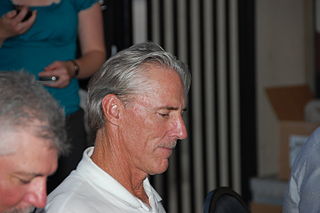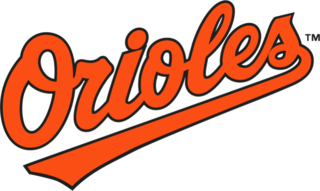Related Research Articles

The 1979 World Series was the championship series of Major League Baseball's (MLB) 1979 season. The 76th edition of the World Series was a best-of-seven playoff between the National League (NL) champion Pittsburgh Pirates (98–64) and the American League (AL) champion Baltimore Orioles (102–57). The Pirates won in seven games, becoming the fourth team in World Series history to come back from a three games to one deficit to win the Series. This marked the second time in the 1970s the Pirates won a World Series Game 7 on the road against the Orioles, the previous time being in the 1971 World Series. The Pirates were famous for adopting Sister Sledge's hit song "We Are Family" as their theme song during the 1979 season.

Donald Joseph Stanhouse is an American former professional baseball pitcher who had an eight-year Major League Baseball (MLB) career (1972–1980) with a brief comeback in 1982. He pitched for the Texas Rangers and Baltimore Orioles of the American League and the Montreal Expos and Los Angeles Dodgers of the National League.

Gary Steven Roenicke is an American former Major League Baseball left fielder for the Montreal Expos (1976), Baltimore Orioles (1978–85), New York Yankees (1986) and Atlanta Braves (1987–88).

The 1979 St. Louis Cardinals season was the team's 98th season in St. Louis, Missouri and its 88th season in the National League. The Cardinals went 86–76 during the season and finished third in the National League East, 12 games behind the eventual NL pennant and World Series champion Pittsburgh Pirates.
The 1953 St. Louis Cardinals season was the team's 72nd season in St. Louis, Missouri and the 62nd season in the National League. The Cardinals went 83–71 during the season and finished in a tie for third place with the Philadelphia Phillies in the National League.

The 2006 Baltimore Orioles season involved the Orioles finishing fourth in the American League East with a record of 70 wins and 92 losses.

The 1991 Baltimore Orioles season was a season in American baseball. It involved the Orioles finishing sixth in the American League East with a record of 67 wins and 95 losses. Cal Ripken. Jr. would be the first shortstop in the history of the American League to win two MVP awards in a career. This was also the Orioles' last year at Memorial Stadium, as they would move into Oriole Park at Camden Yards the following year.
The 1986 Baltimore Orioles season was a season in American baseball. It involved the Orioles finishing seventh in the American League East with a record of 73 wins and 89 losses. On August 5, the Orioles were in second place with a record of 59–47, just 2.5 games out of first place, but the Orioles would lose 42 of their final 56 games to finish in last place in the AL East.

The 1983 Baltimore Orioles won the Major League Baseball World Series after finishing first in the American League East with a record of 98 wins and 64 losses, The Orioles won the championship by beating the Philadelphia Philles, 4–1, in the 1983 World Series. The season was the Orioles' first in nearly 15 years without manager Earl Weaver, who retired after the Orioles missed the playoffs in the final game of the 1982 season. The Orioles replaced the future Hall of Famer Weaver with Joe Altobelli. The World Series victory was the Orioles' first championship since 1970 and their most recent to date.
The 1982 Baltimore Orioles season was a season in American baseball. The Orioles finished second in the American League East to the eventual AL Champions Milwaukee Brewers. They finished with a record of 94 wins and 68 losses. For the second consecutive season, the Orioles recorded the most grand slams in MLB, hitting eight in 1982. This was long time Oriole manager and future Hall of Famer Earl Weaver's last season managing the Orioles until he returned to manage them from 1985 to 1986.
The 1978 Baltimore Orioles season was a season in American baseball. It involved the Orioles finishing fourth in the American League East with a record of 90 wins and 71 losses.
The 1976 Baltimore Orioles season concluded with the ballclub finishing second in the American League East with a record of 88 wins and 74 losses. The Orioles stayed in contention for the division title until a 1–0 loss to the Boston Red Sox at Memorial Stadium on September 25.
The 1973 Baltimore Orioles season was a season in American baseball. It involved the Orioles finishing first in the American League East with a record of 97 wins and 65 losses. They went on to lose to the Oakland Athletics in the 1973 American League Championship Series, three games to two.
The 1972 Baltimore Orioles season was a season in American baseball. It involved the Orioles finishing third in the American League East with a record of 80 wins and 74 losses.
The 1970 Baltimore Orioles season involved the Orioles finishing first in the American League East with a record of 108 wins and 54 losses, 15 games ahead of the runner-up New York Yankees. The Orioles put together one of the most dominant postseason runs of all time, scoring 60 runs in just eight games as they swept the Minnesota Twins for the second straight year in the American League Championship Series and then went on to win their second World Series title over the National League champion Cincinnati Reds in five games, thanks to the glove of third baseman Brooks Robinson.
The 1968 Baltimore Orioles season was a season in American baseball. The team finished second in the American League with a record of 91 wins and 71 losses, 12 games behind the AL and World Series champion Detroit Tigers. The team was managed for the first 80 games by Hank Bauer and he was replaced right after the All-Star break by Earl Weaver. The Orioles' home games were played at Memorial Stadium.
The 1968 California Angels season involved the Angels finishing eighth in the American League with a record of 67 wins and 95 losses.
The 1978 Montreal Expos season was the tenth season in franchise history. The team finished fourth in the National League East with a record of 76–86, 14 games behind the first-place Philadelphia Phillies.
The 1975 Montreal Expos season was the seventh season in the history of the franchise. The Expos finished in last place in the National League East with a record of 75–87, 17½ games behind the Pittsburgh Pirates.
The 1972 Chicago Cubs season was the 101st season of the Chicago Cubs franchise, the 97th in the National League and the 57th at Wrigley Field. The Cubs finished second in the National League East with a record of 85–70.
References
- Johnson, Lloyd; Wolff, Miles, eds. (1997). The Encyclopedia of Minor League Baseball (2nd ed.). Durham, North Carolina: Baseball America. ISBN 978-0-9637189-8-3.
- 1979 Baltimore Orioles team page at Baseball Reference
- 1979 Baltimore Orioles season at baseball-almanac.com